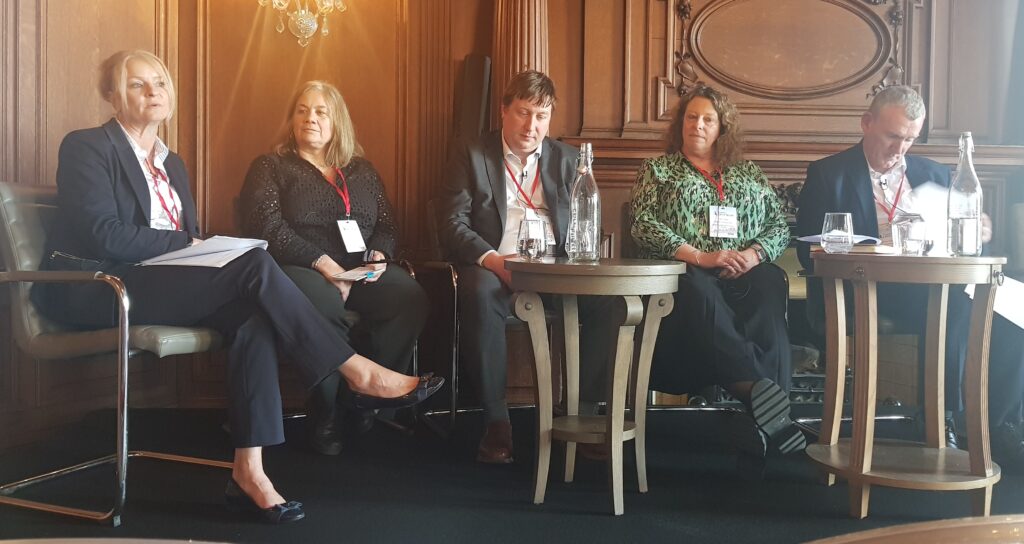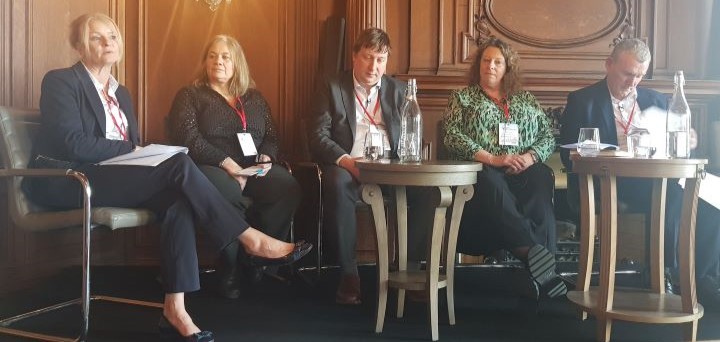Communication, collaboration and culture are the keys to setting a successful budget and avoiding entering s114 territory, according to a finance director’s panel at this week’s LATIF North conference in York.
Chairing, Danny Mather, head of corporate finance at Warrington Borough Council, introduced the session by explaining that the funding system for local government appears “broken”, with the “bespoke” problems that used to cause section 114 notices now a wider, systemic issue affecting all authorities.
Where some of the longer-term solutions were discussed elsewhere at LATIF North, the primary focus of the panel was to present ways to “sort out problems now and in the interim”, Mather said.
Victoria Bradshaw, chief financial officer at Leeds City Council, stressed that the best way to avoid a section 114 is to focus on doing what is in an authority’s control as “changes to the system won’t come overnight”.
It is important to have a clear medium term financial plan which allows the authority to plan for the future and have an understanding of the budget gap, even though this will change, she said. Such a plan offers “something for everyone to work towards” and ensures all staff “understand the financial pressures”.

Forecasts should also be “as robust as they can be”, Bradshaw noted. And while reserves can be used, this should be done in the context of making sure the authority is “sustainable and robust”.
Money should also be set aside for innovation – even though this can be difficult to contemplate when cutting services at the same time. “But we need to invest to improve,” Bradshaw argued.
Communication is another important factor. “We need to work with members to understand the financial position and the difficult decisions we need to make, while investing in services,” she said. “Communication is key to achieving this.” Meetings should occur with all involved, going through the savings programme. “Start early and keep them informed,” Bradshaw said. “Make sure decisions taken now are not going to cause problems in the future.”
Isabel Brittain, finance service director at Kirklees Council, noted that in her first six to seven months in the job, having previous experiences as an interim, the authority was the subject of high profile communications in the Houses of Parliament. Despite this, a “fundamentally good” financial plan was in place when she arrived at Kirklees, she said.
For Brittain, the key to a successful budget and to avoiding entering s114 territory is collaboration. She detailed that service directors at Kirklees met every week, with every saving discussed and analysed before even being aired to directors and cabinet. This approach has led to a consistency around savings where the “flexibility and value” of each saving is considered.
While there are £35m of savings in Kirklees’ latest budget, many of them “are in transit already” because of this approach. Brittain categorised her experience at Kirklees so far as “really good”.
Julian Neilson, director of finance at East Riding of Yorkshire Council, outlined how the systemic financial pressures at local authorities had arisen. A predicted sharp fall in inflation in 2023 did not occur, he said, which impacted on pay. This has been coupled with service demand in the care sector, linked to the Covid crisis. The result has been a “delay in understanding and believing at the government of the position we are in”, Neilson said.
He called the 2024/25 financial settlement “disappointing” and noted that while demand costs continue to rise, “things are getting worse”. Neilson added: “There is no assurance that extra funding will be arriving. Reserves are being depleted and there is no long-term funding certainty.”
Therefore, Neilson said it was critical to get the culture right at an authority to weather the storm. “We are in financial crisis and need to restrict services accordingly,” he said. “We need to get this message across to the whole organisation to shift the focus onto these issues.”
At East Riding of Yorkshire, some of the “fundamentals that have been taken for granted in the past” are being looked at, as are the methods being used for procurement. An assessment of how contracts are managed and value driven is also taking place, he explained.
Broadly speaking, there must be a service transformation while the structure of the authority is being looked at to see “how we can be shaped differently and be smaller”. While technology and AI may be useful in the future, it is expensive right now and takes time to implement, so tackling the crisis “comes down to reducing and stopping services, voluntary retirement schemes, and charging for services we previously didn’t”.
Pam Duke, director of resources (section 151) at Westmorland and Furness Council, said the most important need was to understand your own budgets and savings.
She added that local government reorganisation “might have been a good thing”. The funding formula at Westmorland and Furness had to be split between two authorities, with conversations with the Department for Levelling Up, Housing and Communities helping to drive this.
Duke noted that in looking back at historical records, the authority was still “finding out” surprising things that now needed to be addressed. Ultimately the process has led her to believe in the importance of “going back to basics, and doing the ‘basic and boring’ well”.
Although the aim should be to invest in a preventative agenda, this is not always easy to justify. Authorities must also “drive quick wins”, but there are “not many of those left”, according to Duke.
At Westmorland and Furness Council, a financial sustainability board has been set up, mirroring the efforts of some of the other panellists. “The aim is to work out how to maximise what we’ve got,” Duke said. “There are still some good investments out there, so what’s our appetite?”
In a Q&A session, the panellists called for answers to “fundamental questions” at central government level. For Neilson, this means tackling social care funding as a country and reforming local taxation. Bradshaw called for long-term certainty on the Household Support Fund, and for policies to tackle the problem of recruitment in local government. “How do we work with universities and schools to bring skills through?” she asked. Brittain added that the issue of temporary accommodation needs to be addressed at government level, along with the Housing Revenue Account.
A full round-up of the LATIF North conference can be read in two parts, with the first focusing on the morning session here, and the second assessing the rest of the day’s events here.
—————
FREE bi-weekly newsletters
Subscribe to Room151 Newsletters
Follow us on LinkedIn
Follow us here
Monthly Online Treasury Briefing
Sign up here with a .gov.uk email address
Room151 Webinars
Visit the Room151 channel













